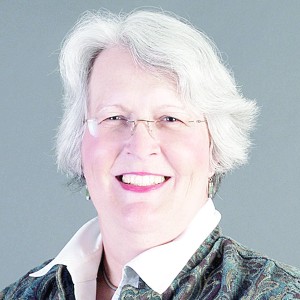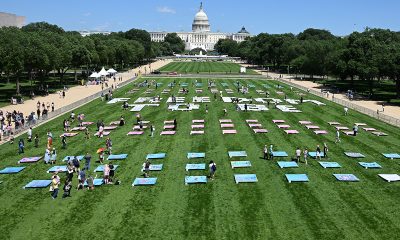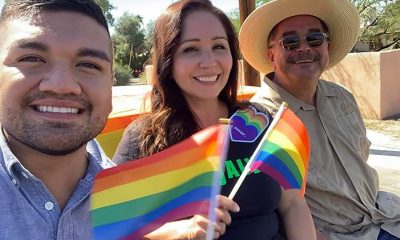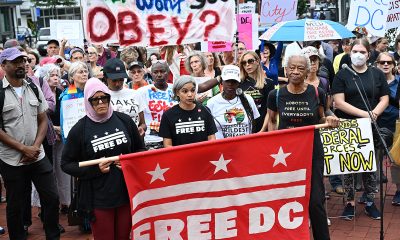National
National news in brief
Trans Houston attorney becomes judge, N.J. adopts anti-bullying bill and more
Transgender Houston attorney becomes judge
HOUSTON — Thirty years ago, Phyllis Frye, a longtime LGBT activist, could have been arrested for wearing women’s clothing in the Houston City Council chamber. The Associated Press reported that Frye, a transgender Houston attorney born as Phillip Frye, fought back tears last week as the mayor appointed her to a municipal bench in the same room where she helped repeal Houston’s “cross-dressing ordinance” in 1980.
The 63-year-old will hear traffic ticket cases and other low-level misdemeanor trials, according to the AP report. Municipal judges are not elected. Frye said she would be the first transgender judge in Texas.
She knows of at least two transgender judges in other parts of the country. Frye applied for the position several months ago and was vetted before being appointed by Mayor Annise Parker, a lesbian, on Wednesday with seven other new associate judges.
“I don’t want to underplay this, because I understand it is very significant,” the AP quoted Frye as saying. “But I don’t want to overplay it either. I don’t want people to think I am anything other than an associate municipal court judge.” There was some quibbling over the appointment from the Houston Area Pastor Council, the AP reported. One local minister said she represented an “anti-family lifestyle.”
Fort Worth drops charges in gay bar fracas
FORT WORTH, Texas — More than a year after a controversial bar inspection at the Rainbow Lounge in Forth Worth, Texas, sent protesters to the streets and vaulted the city into the national spotlight, city officials have dropped charges against four bar patrons, the Fort Worth Star-Telegram reported.
The dismissals came two-and-a-half weeks before Chad Gibson, who suffered a head injury in the June 28, 2009, incident, and George Armstrong had been set to go on trial on public intoxication charges. They had both pleaded not guilty, and Gibson had also pleaded not guilty to assaulting an agent with the Texas Alcoholic Beverage Commission, the paper said.
In a statement released last week, city spokesman Jason Lamers confirmed that the misdemeanor charges against Gibson and Armstrong had been dropped. Public intoxication cases against Dylan Brown, 24, and Jose Macias, 32, were also dropped. Within hours of the fracas at the Rainbow Lounge, local and national protests erupted as patrons accused the officers of using excessive force and questioned whether the bar was targeted because of its mostly gay clientele. Investigations by Fort Worth police and the alcohol commission concluded that no excessive force was used. The commission, however, fired two agents who participated and their supervisor, citing policy violations, the Star-Telegram reported.
La. hospitals announce new visitation rules
NEW ORLEANS — The New Orleans state Department of Health and Human Services announced regulations last week that will require hospitals that receive Medicare or Medicaid financing to drop any visitation policies that discriminate against gays, lesbians and trans people, the New Orleans Times-Picayune reported.
The new rule, which will take effect in January, requires that hospitals have a written policy that must be explained to all patients and allows patients to determine who may visit them, regardless of legal relationships. Hospitals may limit visitation only if there is a clinical reason to do so, according to the rule, which will be added to the conditions for participating in the Medicaid and Medicare programs, the Times-Picayune said.
The rule will trump previous practices in many American hospitals that restricted visitors for some patients — particularly in emergency rooms and intensive care units — to spouses and immediate family, a limitation that often cut off gay and lesbian patients from their partners. The final version, which follows a draft released in June, will go into effect Jan. 16, 60 days after Wednesday’s publication in the federal register and eight months after President Barack Obama first raised the issue in a directive to Health and Human Services Secretary Kathleen Sebelius.
N.J. approves sweeping anti-bullying bill
TRENTON, N.J. — The state legislature voted by overwhelming majorities this week to approve a sweeping anti-bullying bill that could become a model for similar measures across the country, according to media reports and statements from Garden State Equality.
“As someone brutally bullied in my own youth, I can’t even begin to describe how the passage of this bill is a moment of deeply poignant, personal healing for me and thousands of others who have been bullied,” said Steven Goldstein, chair of Garden State Equality. “The best revenge is to make the world a kinder place. This legislation will make our state a kinder, safer place for students for generations to come.”
The Anti-Bullying Bill of Rights applies to schools from kindergarten through 12th grade, strengthens an existing cyber bullying law, applies to bullying off school grounds that carries into schools, and has a section that applies to the state’s public universities, according to Garden State Equality.
It is the first such bill to set deadlines for incidents of bullying to be reported, investigated and resolved. Teachers and other school personnel will have to report incidents of bullying to principals on the same day as a bullying incident. An investigation of the bullying must begin within one school day. A school will have to complete its investigation of bullying within 10 school days, after which there must be a resolution of the situation, the statewide LGBT rights group announced.
The bill passed the Senate 30-0 and the Assembly 72-1.
Philly’s settlement with Scouts draws ire of gay leaders
PHILADELPHIA — Prominent gay leaders in Philadelphia are voicing criticism of a proposed legal settlement between the city and the regional Boy Scouts organization, and a key City Councilman is balking at the deal, the Philadelphia Gay News reported.
The proposal calls for the Boy Scouts group to pay the city $500,000 to buy its 13,000-square-foot headquarters in Logan Square, the focus of a civil-rights dispute that began over the Scouts’ national ban on gay members. The price tag is less than half the appraised value of the building. But the settlement would end an expensive legal fight and the risk that city taxpayers would eventually have to pay the Scouts’ legal bills, now approaching $1 million.
Gay rights advocates say the city’s lawyers are putting financial concerns ahead of principle, appearing to subsidize the Scouts’ discrimination, Philadelphia Gay News reported. City Solicitor Shelley Smith and the Scouts’ attorney, Sandra Girifalco, had issued a joint statement last week describing their agreement as a “win-win situation” for both their clients, predicting that a necessary ordinance would be introduced the next day in City Council. But Councilman Darrell Clarke, whose district includes the property, said he wasn’t ready to introduce anything. The settlement statement had been “premature,” he said, because there hadn’t been enough communication with neighborhood residents or the gay community.
The dispute began with a 5-4 U.S. Supreme Court decision in 2000 that upheld the legality of the national organization’s ban on gay Scouts and troop leaders. That put the Scouts organization in conflict with the city charter’s ban on discrimination rooted in sexual orientation.
Former GLAAD official to head S.F. AIDS Foundation
SAN FRANCISCO — The San Francisco AIDS Foundation has appointed Neil Giuliano as its new chief executive. He’ll start Dec. 13.
Giuliano was previously head of the Gay & Lesbian Alliance Against Defamation (GLAAD) and produced its annual awards programs. He was also the mayor of Tempe, Ariz., for 10 years beginning in 1994. He plans to publish a memoir next year. The Foundation works to end HIV.

The Comings & Goings column is about sharing the professional successes of our community. We want to recognize those landing new jobs, new clients for their business, joining boards of organizations and other achievements. Please share your successes with us at [email protected].
Congratulations to Gil Pontes III on his recent appointment to the Financial Advisory Board for the City of Wilton Manors, Fla. Upon being appointed he said, “I’m honored to join the Financial Advisory Board for the City of Wilton Manors at such an important moment for our community. In my role as Executive Director of the NextGen Chamber of Commerce, I spend much of my time focused on economic growth, fiscal sustainability, and the long-term competitiveness of emerging business leaders. I look forward to bringing that perspective to Wilton Manors — helping ensure responsible stewardship of public resources while supporting a vibrant, inclusive local economy.”
Pontes is a nonprofit executive with years of development, operations, budget, management, and strategic planning experience in 501(c)(3), 501(c)(4), and political organizations. Pontes is currently executive director of NextGen, Chamber of Commerce. NextGen Chamber’s mission is to “empower emerging business leaders by generating insights, encouraging engagement, and nurturing leadership development to shape the future economy.” Prior to that he served as managing director of The Nora Project, and director of development also at The Nora Project. He has held a number of other positions including Major Gifts Officer, Thundermist Health Center, and has worked in both real estate and banking including as Business Solutions Adviser, Ironwood Financial. For three years he was a Selectman, Town of Berkley, Mass. In that role, he managed HR and general governance for town government. There were 200+ staff and 6,500 constituents. He balanced a $20,000,000 budget annually, established an Economic Development Committee, and hired the first town administrator.
Pontes earned his bachelor’s degree in political science from the University of Massachusetts, Dartmouth.
Kansas
ACLU sues Kansas over law invalidating trans residents’ IDs
A new Kansas bill requires transgender residents to have their driver’s licenses reflect their sex assigned at birth, invalidating current licenses.

Transgender people across Kansas received letters in the mail on Wednesday demanding the immediate surrender of their driver’s licenses following passage of one of the harshest transgender bathroom bans in the nation. Now the American Civil Liberties Union is filing a lawsuit to block the ban and protect transgender residents from what advocates describe as “sweeping” and “punitive” consequences.
Independent journalist Erin Reed broke the story Wednesday after lawmakers approved House Substitute for Senate Bill 244. In her reporting, Reed included a photo of the letter sent to transgender Kansans, requiring them to obtain a driver’s license that reflects their sex assigned at birth rather than the gender with which they identify.
According to the reporting, transgender Kansans must surrender their driver’s licenses and that their current credentials — regardless of expiration date — will be considered invalid upon the law’s publication. The move effectively nullifies previously issued identification documents, creating immediate uncertainty for those impacted.
House Substitute for Senate Bill 244 also stipulates that any transgender person caught driving without a valid license could face a class B misdemeanor, punishable by up to six months in jail and a $1,000 fine. That potential penalty adds a criminal dimension to what began as an administrative action. It also compounds the legal risks for transgender Kansans, as the state already requires county jails to house inmates according to sex assigned at birth — a policy that advocates say can place transgender detainees at heightened risk.
Beyond identification issues, SB 244 not only bans transgender people from using restrooms that match their gender identity in government buildings — including libraries, courthouses, state parks, hospitals, and interstate rest stops — with the possibility for criminal penalties, but also allows for what critics have described as a “bathroom bounty hunter” provision. The measure permits anyone who encounters a transgender person in a restroom — including potentially in private businesses — to sue them for large sums of money, dramatically expanding the scope of enforcement beyond government authorities.
The lawsuit challenging SB 244 was filed today in the District Court of Douglas County on behalf of anonymous plaintiffs Daniel Doe and Matthew Moe by the American Civil Liberties Union, the ACLU of Kansas, and Ballard Spahr LLP. The complaint argues that SB 244 violates the Kansas Constitution’s protections for personal autonomy, privacy, equality under the law, due process, and freedom of speech.
Additionally, the American Civil Liberties Union filed a temporary restraining order on behalf of the anonymous plaintiffs, arguing that the order — followed by a temporary injunction — is necessary to prevent the “irreparable harm” that would result from SB 244.
State Rep. Abi Boatman, a Wichita Democrat and the only transgender member of the Kansas Legislature, told the Kansas City Star on Wednesday that “persecution is the point.”
“This legislation is a direct attack on the dignity and humanity of transgender Kansans,” said Monica Bennett, legal director of the ACLU of Kansas. “It undermines our state’s strong constitutional protections against government overreach and persecution.”
“SB 244 is a cruel and craven threat to public safety all in the name of fostering fear, division, and paranoia,” said Harper Seldin, senior staff attorney for the ACLU’s LGBTQ & HIV Rights Project. “The invalidation of state-issued IDs threatens to out transgender people against their will every time they apply for a job, rent an apartment, or interact with police. Taken as a whole, SB 244 is a transparent attempt to deny transgender people autonomy over their own identities and push them out of public life altogether.”
“SB 244 presents a state-sanctioned attack on transgender people aimed at silencing, dehumanizing, and alienating Kansans whose gender identity does not conform to the state legislature’s preferences,” said Heather St. Clair, a Ballard Spahr litigator working on the case. “Ballard Spahr is committed to standing with the ACLU and the plaintiffs in fighting on behalf of transgender Kansans for a remedy against the injustices presented by SB 244, and is dedicated to protecting the constitutional rights jeopardized by this new law.”
National
After layoffs at Advocate, parent company acquires ‘Them’ from Conde Nast
Top editorial staff let go last week

Former staff members at the Advocate and Out magazines revealed that parent company Equalpride laid off a number of employees late last week.
Those let go included Advocate editor-in-chief Alex Cooper, Pride.com editor-in-chief Rachel Shatto, brand partnerships manager Erin Manley, community editor Marie-Adélina de la Ferriére, and Out magazine staff writers Moises Mendez and Bernardo Sim, according to a report in Hollywood Reporter.
Cooper, who joined the company in 2021, posted to social media that, “Few people have had the privilege of leading this legendary LGBTQ+ news outlet, and I’m deeply honored to have been one of them. To my team: thank you for the last four years. You’ve been the best. For those also affected today, please let me know how I can support you.”
The Advocate’s PR firm when reached by the Blade said it no longer represents the company. Emails to the Advocate went unanswered.
Equalpride on Friday announced it acquired “Them,” a digital LGBTQ outlet founded in 2017 by Conde Nast.
“Equalpride exists to elevate, celebrate and protect LGBTQ+ storytelling at scale,” Equalpride CEO Mark Berryhill said according to Hollywood Reporter. “By combining the strengths of our brands with this respected digital platform, we’re creating a unified ecosystem that delivers even more impact for our audiences, advertisers, and community partners.”
It’s not clear if “Them” staff would take over editorial responsibilities for the Advocate and Out.
-

 District of Columbia5 days ago
District of Columbia5 days agoCapital Pride board member resigns, alleges failure to address ‘sexual misconduct’
-

 India4 days ago
India4 days agoActivists push for better counting of transgender Indians in 2026 Census
-

 Advice4 days ago
Advice4 days agoDry January has isolated me from my friends
-

 District of Columbia4 days ago
District of Columbia4 days agoCapital Pride reveals 2026 theme





















